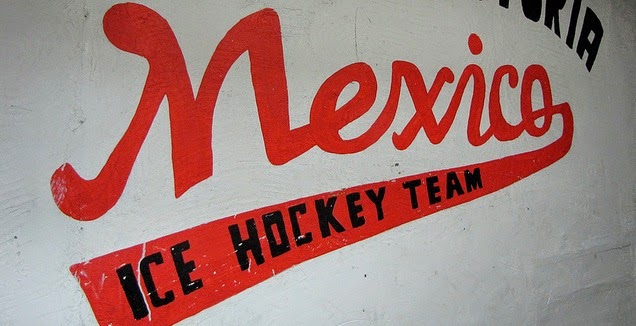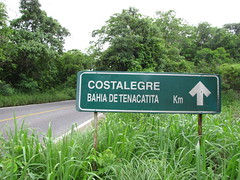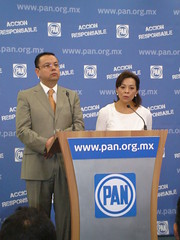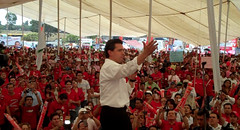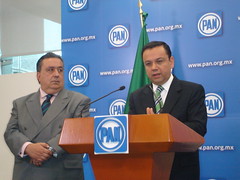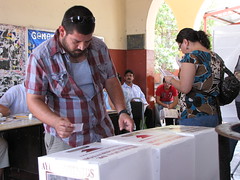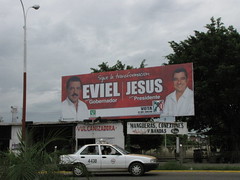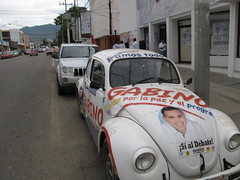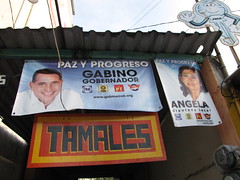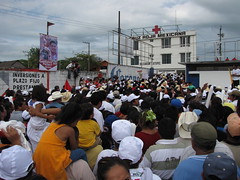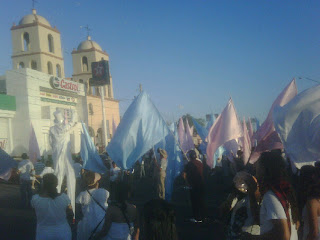 Members of Mexico's mining and metalworkers' union show support for their fugitive leader, Napoleón Gómez Urrutia, during a rally at union headquarters in Mexico City. Gómez is living in Vancouver to avoid apprehension on charges pertaining to the alleged mismanagement of a $55 million trust fund.
Members of Mexico's mining and metalworkers' union show support for their fugitive leader, Napoleón Gómez Urrutia, during a rally at union headquarters in Mexico City. Gómez is living in Vancouver to avoid apprehension on charges pertaining to the alleged mismanagement of a $55 million trust fund.
The Federal Police evicted the remaining striking workers at the giant copper pit in Cananea, Sonora, where miners loyal to fugitive mining union boss Napoleón Gómez Urrutia had shut down the lucrative Grupo México property for nearly three years. The miners originally went on strike over health and wage issues, but the labour stoppage became a show of support for Gómez, who is accused of misappropriating a $55 million workers' trust fund and has lived in Vancouver to avoid apprehension on fraud and embezzlement charges.
Mine owner Grupo México - a bitter enemy of Gómez Urrutia - charged that the strike at Cananea was nothing more than an attempt to pressure the Mexican government to drop charges against the union boss as the health and wage issues were resolved long ago. Other rivals of Gómez agreed.
"We regret that things were resolved in this way, (but) the only person to blame is Napoleón Gómez Urrutia," Carlos Pavón, the union's former director of political matters, told W Radio. "He never wanted to resolve the problem through dialogue. Napoleón always wanted to insert (the issue) of the apprehension orders against him."
Pavón
was arrested in late 2008 for fraud and extortion and left the union a short time later.
The most recent raid on Cananea once again put the spotlight on Gómez Urrutia, perhaps the most colourful, controversial and maverick union leader of the past ten years.
Gómez is reviled by a group of dissidents for allegedly making off with their trust fund and was reputedly responsible for derailing the labour reforms proposed during the administration of former president Vicente Fox.
Chihuahua-based Veta de Plata, a cooperative of former mining union members and trust fund holders say Gomez has failed to provide an adequate explanation for what happened to their money and improperly dissolved the trust fund by acting as a signatory for both the union and the trust fund holders.
Court documents provided by the cooperative in 2008 show trust fund money being moved out of the country and being used to pay for shopping excursions in Dallas and personal credit card debts of Gómez's relatives.
Gómez's backers say the union's accounts have been audited and no mismanagement occurred.
The trust fund was established after the Cananea mine was privatized in 1989, when then-president Carlos Salina launched the widespread sale of many government-run enterprises. Workers' in a number of privatized mines received five percent of the shares, which were held in a trust fund.
Although controversial, Gómez draws fierce support from some quarters for his tough negotiating tactics, which produce contracts better than other unions - a rarity in a country notorious for wealthy union bosses and poorly paid workers, and a history of unions being little more than turn-out-the vote machines for the Institutional Revolutionary Party (PRI). Supporters say Mexican mining and smelting executives still travel to Vancouver to negotiate collective agreements with him - even though he's not recognized by the Mexican government as a union leader.
"He's a different kind of union man," said Aldo Muñoz Armenta, a labour expert at the Autonomous University of the State of Mexico in Toluca. Muñoz says many Mexican union contracts are based on the national minimum wage and the inflation rate, but Gómez - who previously ran the national mint and a government mining company in Autlán, Jalisco - would tie wages to the price of minerals.
The Interior Ministry said in a June 7 statement the operation began the previous day and was carried out by some 2,000 federal police officers; seven
arrests were made for an arson at the mine. The Labour Secretariat had declared the strike illegal back in January 2008.
The mining union blasted the expulsion as illegal. A coalition of so-called "independent unions" - the telephone workers, electrical workers, UNAM workers and other unions generally not affiliated with either the PRI or governing National Action Party (PAN) - broke dialogue with the federal government in response to the raid. Foreign unions such as the USW, blasted the expulsion, too. The left-wing Democratic Revolution Party (PRD)
promised demonstrations at the Supreme Court and outside the Grupo México offices in the upscale Polanco district to protest both the action at Cananea and the ongoing struggle of the SME, the union whose members were tossed out of work when the federal government closed down the money-losing and notoriously inefficient Mexico City utility, Luz y Fuerza, last fall.
POLITICALLY UNPOPULAR
The SME and its allies branded the decision to dissolve Luz y Fuerza, "Political," as the union's leadership - which would threaten disruptive strikes every spring that would have left Mexico City and the surrounding states in the dark - is considered close with scorned 2006 presidential runner up Andrés Manuel López Obrador, the nation's self-proclaimed "legitimate president." (It's suspected SME money helped finance López Obrador's "legitimate government.")
Independents unions such as the SME have backed the mine and metalworkers for various for reasons, including a mutual dislike of the conservative and pro-business PAN and an unwillingness to join PRI-affiliated labour groups such as the CROC, CROM and CTM, which have long been pillars in the PRI's corporatist system and headed by leaders accused of not acting in the best interest of the rank-and-file.
Muñoz says the recognition of union leaders is a "judicial process" in most countries, while in Mexico, "It's a political process."
The Labour Secretariat refused to recognize Gómez's 2008 re-election as leader of the mining union, saying he was not a member in good standing and he never worked as a miner - a prerequisite for assuming the position.
Gómez took over the union after the death of his father, Napoleón Gómez Sada nearly 10 years ago. The elder Gómez was extremely popular among the membership, including those now expressing a dislike for his son.
He assumed control after submitting a document to the Labour Secretariat saying that Gómez - who went to Oxford, was a pre-candidate for the 1992 PRI gubernatorial race in Nuevo León and would appear in the society pages of Monterrey-area society publications - worked in the accounting department of a gold mine in the state of Durango for the salary of 28 pesos per day.
Some union dissidents found that a little hard to believe, including one Veta de Plata member who called the story, "A lie as big as all of Texas."
Others fighting for labour rights in Mexico take an equally unfavourable view of Gómez, who has frequently accused Grupo México of "industrial homicide" for the February 2006
mine disaster at Pasta de Conchos in the northern state of Coahuila. The blast killed 65 miners; the bodies of 63 workers remain trapped in the coal mine.
"If Napoleón Gómez Urrutia were such a good union leader, Pasta de Conchos wouldn't have happened," said one widow, who lost her husband in the mine, told me in 2009. Another widows, Elvira Martínez, one of the most persistent advocates of having the bodies pulled from the mine, told me that many of the dead miners were not union members, but paid union dues and received little in return.
Christina Auerbach Benavides, a lawyer with the labour ministry of the Diocese of Saltillo, has worked with the widows since the mine disaster occurred. She says the mining union signed a joint health and safety report with the company and government just 12 days before the mine disaster.
She alleged in early 2010, "The union utilizes the subject of Pasta de Conchos when it wants to raise the issue of Napoleon Gomez."
The
union and its Canadian backers - who include NDP leader Jack Layton - have lauded Gómez for trying to improve mine safety in Mexico and allege it has led to him being persecuted by the federal government.

